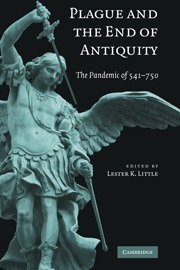Book contents
- Frontmatter
- Contents
- Contributors
- Preface
- Map
- Plague and the End of Antiquity
- I INTRODUCTION
- II THE NEAR EAST
- III THE BYZANTINE EMPIRE
- IV THE LATIN WEST
- 7 Consilia humana, ops divina, superstitio
- 8 Plague in Spanish Late Antiquity
- 9 Plague in Seventh-Century England
- 10 The Plague and Its Consequences in Ireland
- V THE CHALLENGE OF EPIDEMIOLOGY AND MOLECULAR BIOLOGY
- Bibliography
- Index
7 - Consilia humana, ops divina, superstitio
Seeking Succor and Solace in Times of Plague, with Particular Reference to Gaul in the Early Middle Ages
Published online by Cambridge University Press: 05 June 2012
- Frontmatter
- Contents
- Contributors
- Preface
- Map
- Plague and the End of Antiquity
- I INTRODUCTION
- II THE NEAR EAST
- III THE BYZANTINE EMPIRE
- IV THE LATIN WEST
- 7 Consilia humana, ops divina, superstitio
- 8 Plague in Spanish Late Antiquity
- 9 Plague in Seventh-Century England
- 10 The Plague and Its Consequences in Ireland
- V THE CHALLENGE OF EPIDEMIOLOGY AND MOLECULAR BIOLOGY
- Bibliography
- Index
Summary
The words plucked from Livy for the title of this essay are not all his own. However, by adding superstitio to Thucydides' “catalogue” of human reactions to the plague, Livy yet again confirms in the eyes of this reader his status as a matchless historian with an uncanny gift for perceptive analysis.
The invention of this new category coincides with a turning point in Livy's Roman History, when the manly mores of old, the cornerstone of Rome's greatness, started to slacken, through contact with foreign customs. In order to “allay the wrath of the gods,” which was believed to have unleashed the plague in 364 BC, games were held and, for the first time, included theatrical performances as were already common in Etruria, Umbria, and Greece. To no effect. Not only were the Romans not “reconciled with the gods,” but “their own consciences were not freed”: The plague continued unabated as did the Romans' feeling of guilt, for they were certain that some past action of theirs had caused the gods to mete out this most severe of chastisements.
Livy's emendation of Thucydides confers paradigmatic value to his behavioral typology. I use this typology as an organizing principle for the materials I have assembled. I feel, however, that this requires a word of explanation.
When threatened by premature though natural death, man has always – whatever the time and place – sought to escape his fate.
- Type
- Chapter
- Information
- Plague and the End of AntiquityThe Pandemic of 541–750, pp. 135 - 149Publisher: Cambridge University PressPrint publication year: 2006
- 4
- Cited by



